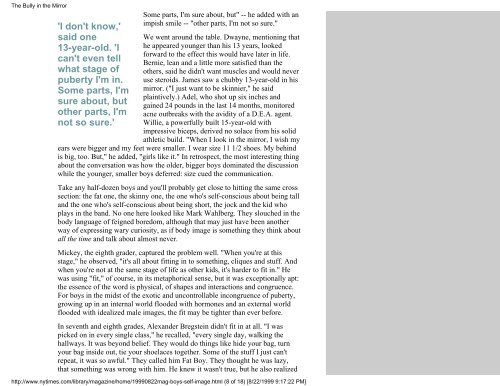The New York Times Magazine, Sunday, August 22 - Unauthorized ...
The New York Times Magazine, Sunday, August 22 - Unauthorized ...
The New York Times Magazine, Sunday, August 22 - Unauthorized ...
Create successful ePaper yourself
Turn your PDF publications into a flip-book with our unique Google optimized e-Paper software.
<strong>The</strong> Bully in the Mirror<br />
'I don't know,'<br />
said one<br />
13-year-old. 'I<br />
can't even tell<br />
what stage of<br />
puberty I'm in.<br />
Some parts, I'm<br />
sure about, but<br />
other parts, I'm<br />
not so sure.'<br />
Some parts, I'm sure about, but" -- he added with an<br />
impish smile -- "other parts, I'm not so sure."<br />
We went around the table. Dwayne, mentioning that<br />
he appeared younger than his 13 years, looked<br />
forward to the effect this would have later in life.<br />
Bernie, lean and a little more satisfied than the<br />
others, said he didn't want muscles and would never<br />
use steroids. James saw a chubby 13-year-old in his<br />
mirror. ("I just want to be skinnier," he said<br />
plaintively.) Adel, who shot up six inches and<br />
gained 24 pounds in the last 14 months, monitored<br />
acne outbreaks with the avidity of a D.E.A. agent.<br />
Willie, a powerfully built 15-year-old with<br />
impressive biceps, derived no solace from his solid<br />
athletic build. "When I look in the mirror, I wish my<br />
ears were bigger and my feet were smaller. I wear size 11 1/2 shoes. My behind<br />
is big, too. But," he added, "girls like it." In retrospect, the most interesting thing<br />
about the conversation was how the older, bigger boys dominated the discussion<br />
while the younger, smaller boys deferred: size cued the communication.<br />
Take any half-dozen boys and you'll probably get close to hitting the same cross<br />
section: the fat one, the skinny one, the one who's self-conscious about being tall<br />
and the one who's self-conscious about being short, the jock and the kid who<br />
plays in the band. No one here looked like Mark Wahlberg. <strong>The</strong>y slouched in the<br />
body language of feigned boredom, although that may just have been another<br />
way of expressing wary curiosity, as if body image is something they think about<br />
all the time and talk about almost never.<br />
Mickey, the eighth grader, captured the problem well. "When you're at this<br />
stage," he observed, "it's all about fitting in to something, cliques and stuff. And<br />
when you're not at the same stage of life as other kids, it's harder to fit in." He<br />
was using "fit," of course, in its metaphorical sense, but it was exceptionally apt:<br />
the essence of the word is physical, of shapes and interactions and congruence.<br />
For boys in the midst of the exotic and uncontrollable incongruence of puberty,<br />
growing up in an internal world flooded with hormones and an external world<br />
flooded with idealized male images, the fit may be tighter than ever before.<br />
In seventh and eighth grades, Alexander Bregstein didn't fit in at all. "I was<br />
picked on in every single class," he recalled, "every single day, walking the<br />
hallways. It was beyond belief. <strong>The</strong>y would do things like hide your bag, turn<br />
your bag inside out, tie your shoelaces together. Some of the stuff I just can't<br />
repeat, it was so awful." <strong>The</strong>y called him Fat Boy. <strong>The</strong>y thought he was lazy,<br />
that something was wrong with him. He knew it wasn't true, but he also realized<br />
http://www.nytimes.com/library/magazine/home/199908<strong>22</strong>mag-boys-self-image.html (8 of 18) [8/<strong>22</strong>/1999 9:17:<strong>22</strong> PM]






